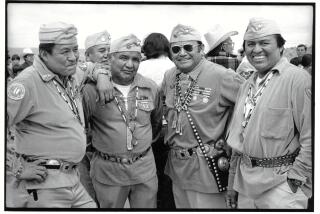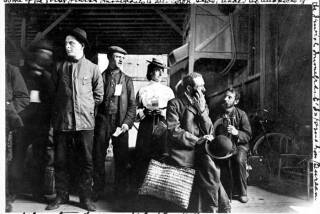Editorial: 75 years later, looking back at The Times’ shameful response to the Japanese internment
Seventy-five years ago today, President Franklin Roosevelt signed Executive Order 9066, declaring parts of the United States to be military zones from which particular groups of people could be “excluded” for security reasons. The order set the stage for the relocation and internment, beginning the following month, of 120,000 people of Japanese ancestry, most of whom were American citizens living on the West Coast.
To our lasting shame, here’s what The Times editorial page had to say about the matter at the time:
For the record:
11:51 p.m. April 26, 2024An earlier version of this editorial stated that President Clinton awarded the Presidential Medal of Freedom to Fred Korematsu in 1988. Korematsu was awarded the medal in 1998.
“This is war. And in wartime, the preservation of the nation becomes the first duty. Everything must be subordinated to that. Every necessary precaution must be taken to insure reasonable safety from spies and saboteurs so that our armed forces can function adequately and our industrial machinery may continue to work free from peril.”
And this:
“The time has come to realize that the rigors of war demand proper detention of Japanese and their immediate removal from the most acute danger spots. It is not a pleasant task. But it must be done and done now. There is no safe alternative.”
And this, a year or so later, when some people were calling for the release of those who had been interned:
“As a race, the Japanese have made for themselves a record for conscienceless treachery unsurpassed in history. Whatever small theoretical advantages there might be in releasing those under restraint in this country would be enormously outweighed by the risks involved.”
Even in times of stress and fear, we need to keep a firm grip on our core values and bedrock principles.
That was another time, and another Times. This newspaper has long since reversed itself on the subject. Not only was some of our reasoning explicitly racist, but in our desperate attempts to sound rational — by supposedly balancing the twin imperatives of security and liberty in the midst of World War II — we exaggerated the severity of the threat while failing to acknowledge the significance of revoking the most fundamental rights of American citizens based solely on their ancestry. In the 1980s, the Commission on Wartime Relocation and Internment of Civilians found there had been no military justification for the exclusion and noted that no Japanese Americans had been convicted of spying or sabotage. The incarceration was a “grave injustice,” the congressional commission concluded.
Korematsu vs. United States, the 1944 Supreme Court decision that found Executive Order 9066 to be constitutional, has never been officially overturned, but it is widely viewed as odious and discredited, and in 1998, President Clinton awarded its plaintiff, Fred Korematsu, the Presidential Medal of Freedom. The original executive order, signed by President Roosevelt, and many other artifacts of the period are currently on display in an exhibit titled “Instructions to All Persons: Reflections on Executive Order 9066” at the Japanese American National Museum in Little Tokyo.
Strange things happen in times of turmoil, hysteria and populist anger. Given what we wrote in 1942, the 75th anniversary is a time for The Times editorial board to exercise some humility and to reflect on how we reach our positions on the passionate issues of the day. Here’s one obvious conclusion: Even in times of stress and fear, we need to keep a firm grip on our core values and bedrock principles.
For Americans more generally, the mistreatment of innocent Japanese people and Japanese Americans (and thousands of Germans and Italians as well) during the war is particularly relevant as a new administration in Washington stokes fears of a surge in nationalism and xenophobia — rejecting humanitarianism and internationalism in favor of isolationism and America First-ism. The simplest and clearest lesson from the exclusion and internment is that it is wrong to view entire populations as monoliths and attribute to all members of a group — be they Japanese or Muslims or Mexicans or Iranians or even Americans — the characteristics of a few. This is at the heart of what it means to not be prejudiced.
MORE FROM OPINION
Congress shouldn’t duck the public
When the Nazis wrote the Nuremberg laws, they looked to racist American statutes
Under Trump, an incoherent foreign policy might be better than clarity
California to Trump: What ‘American carnage’? Things are far safer here than in the rest of America
More to Read
A cure for the common opinion
Get thought-provoking perspectives with our weekly newsletter.
You may occasionally receive promotional content from the Los Angeles Times.






